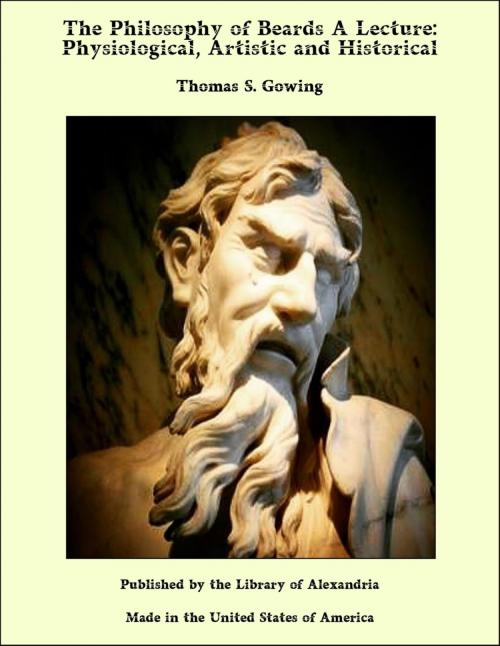The Philosophy of Beards A Lecture: Physiological, Artistic and Historical
Nonfiction, Religion & Spirituality, New Age, History, Fiction & Literature| Author: | Thomas S. Gowing | ISBN: | 9781465630155 |
| Publisher: | Library of Alexandria | Publication: | March 8, 2015 |
| Imprint: | Language: | English |
| Author: | Thomas S. Gowing |
| ISBN: | 9781465630155 |
| Publisher: | Library of Alexandria |
| Publication: | March 8, 2015 |
| Imprint: | |
| Language: | English |
OUR most universal and most imaginative Poet, whose single lines are often abstracts and epitomes of poems, makes Hamlet exclaim—“What a piece of work is man! How noble in reason! how infinite in faculties! in form and moving, how express and admirable! in action, how like an angel! in apprehension, how like a God! the beauty of the world! the paragon of animals!” And yet this same glorious creature, thus worthily praised, is, with singular contradiction, so forgetful of his higher attributes, that he can despise his reason! ignore his infinite faculties! deliberately deface that form so express and admirable! descend to actions that smack rather of the demon than the angel! Drown his godlike apprehension in drink! Shave off his majestic beauty! and become, instead of the paragon—the parody of animals! O Fashion! most mighty, but most capricious of goddesses! what strange vagaries playest thou with the sons and daughters of men! What is there so lovely, that thou canst not, with a word, transform into an object of disgust and abhorrence? What so ugly and repulsive, but thou hast the art to exalt it into a golden image for thy slaves to worship, on pain of the fiery furnace of ridicule? Could a collection be made of the forms and figures, modes and mummeries, which thou hast imposed on thy ofttimes too willing votaries, it would task the most vivid imagination, the most fantastic stretch of fancy, to furnish a description of the incongruous contents! Perhaps no human feature has been more the subject of Fashion’s changeable humours than theBeard, of which it is purposed to night to render some account, in the hope of being able to prove that in no instance has she been guilty of more deliberate offences against nature and reason! With this object in view, the structure, intention, and uses of the Beard will be examined, and its artistic relations indicated; its history will next be traced; and a reply will then be briefly given to some objections against wearing the Beard, not embraced in the preceding matter.
OUR most universal and most imaginative Poet, whose single lines are often abstracts and epitomes of poems, makes Hamlet exclaim—“What a piece of work is man! How noble in reason! how infinite in faculties! in form and moving, how express and admirable! in action, how like an angel! in apprehension, how like a God! the beauty of the world! the paragon of animals!” And yet this same glorious creature, thus worthily praised, is, with singular contradiction, so forgetful of his higher attributes, that he can despise his reason! ignore his infinite faculties! deliberately deface that form so express and admirable! descend to actions that smack rather of the demon than the angel! Drown his godlike apprehension in drink! Shave off his majestic beauty! and become, instead of the paragon—the parody of animals! O Fashion! most mighty, but most capricious of goddesses! what strange vagaries playest thou with the sons and daughters of men! What is there so lovely, that thou canst not, with a word, transform into an object of disgust and abhorrence? What so ugly and repulsive, but thou hast the art to exalt it into a golden image for thy slaves to worship, on pain of the fiery furnace of ridicule? Could a collection be made of the forms and figures, modes and mummeries, which thou hast imposed on thy ofttimes too willing votaries, it would task the most vivid imagination, the most fantastic stretch of fancy, to furnish a description of the incongruous contents! Perhaps no human feature has been more the subject of Fashion’s changeable humours than theBeard, of which it is purposed to night to render some account, in the hope of being able to prove that in no instance has she been guilty of more deliberate offences against nature and reason! With this object in view, the structure, intention, and uses of the Beard will be examined, and its artistic relations indicated; its history will next be traced; and a reply will then be briefly given to some objections against wearing the Beard, not embraced in the preceding matter.















